SPECIAL: GLOBAL RISKS DAY
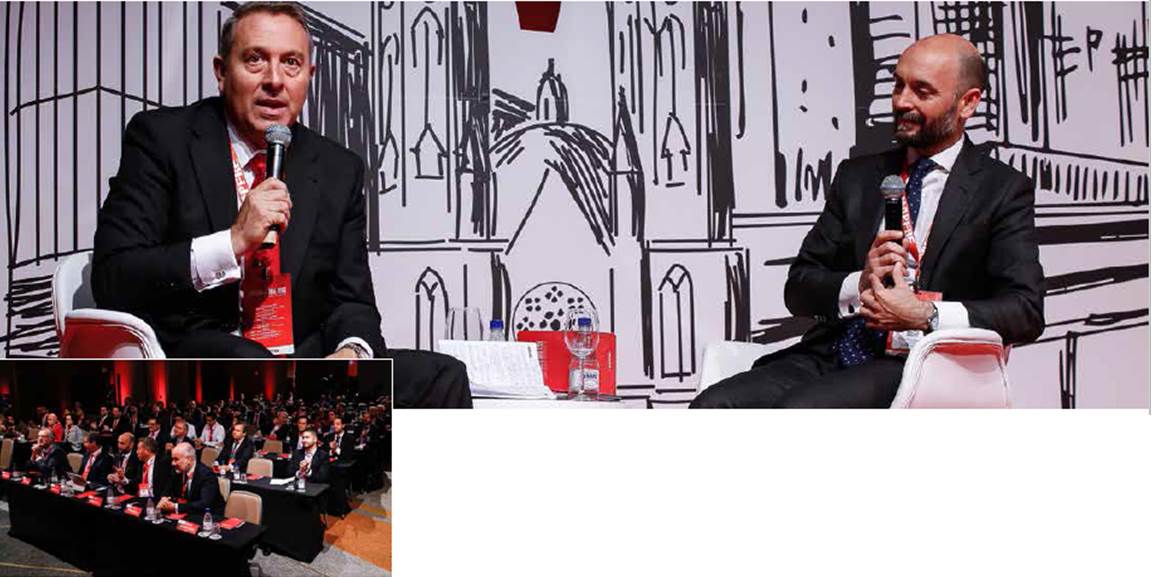
The notion that the future is nothing more than a moment distant in time is already of everyday use for all of us. Today, to speak of change and evolution is to speak about the present. The world has always experienced changes. What makes now different?”Speed!”, says Luis Gutiérrez, president of GRUPO ASEGURADOR BANCO DO BRASIL Y MAPFRE for the automobile, general insurance and affinities departments in Brazil. Accompanied by Bosco Francoy, COO of MAPFRE Global Risks, he welcomed the more than 200 guests to Global Risks Day, which took place on June 12 at the Hilton Hotel, in São Paulo (SP).
Both announced what was to come:a stimulating discussion about the current moment and the challenges that will affect the large risks segment in the coming years. First, Bosco provided a quick overview of what happened the previous year. “2017 was very special for large risks and the insurance market.We experienced hurricanes and other large impact losses. There was new capital for the sector, competition and increased prices in some areas. We kept our focus on the customer, who is always of paramount importance.And we made some changes, always with this in mind”, he stated.
New strategic concerns were also raised. “A survey of how CEOs see the future of their professions revealed that 40% of them believe they will be the victims of cyberattacks while 38% anticipate having to deal with generational issues at their companies.But there is also some optimism:90% expect an economic boom; however, of these, 55% believe that growth will not reach 2%. These are common concerns for all of us.”
In its second edition celebrated in Brazil, Global Risks Day mobilized representatives of such companies as Ecorodovias, Telefónica, Azul Linhas Aéreas, Aon, Willis Towers Watson, Grupo Ultra and Grupo Storm, among others, in addition to the Brazilian Risk Management Association (ABGR) and the Brazilian Wind Power Association (ABEEólica).
To discuss such matters as the importance of a business plan, risk analysis factors, global trends, third-party liability and the impact of new energy technologies, the event benefited from the participation of specialists from different sectors of the industry on four panels moderated by MAPFRE executives. Below you will find a summary of the subjects addressed on each panel as well as an interview with Luis Gutiérrez about the current situation in the major risks segment.
CUSTOMER VISION
From the perspective of companies that are customers of the insurer, the first panel of the day debated the importance of a continuity plan in risk management. Moderated by Camilo Buzzi, of GRUPO ASEGURADOR BANCO DO BRASIL Y MAPFRE,the participants explained how they structure their companies to minimize the effects of a major loss. Shared features are the actions of different areas working together, priority attention to their respective customers and encouraging the use of simulations that usually anticipate the different scenarios and measures to be taken in each situation.
The recent truckers’ strike, which mobilized the entire county, was mentioned as an example of the unpredictable: “At our company, we have electric cars, which means that somebody already predicted this could happen.When the strike ended, acts of vandalism began; we were prepared for this as well.What nobody foresaw was the lack of food and water in the cafeteria”, Bernadete Castro, of Ecorodovias, explained.
“The contingency plan works. Clearly, it can’t anticipate 100% of the things that happen but people are in agreement about the simulations.What’s important is to always try. Simulations and tests are an obligation which, in the end, provides a return, added Cristiane Alves, of ABGR.
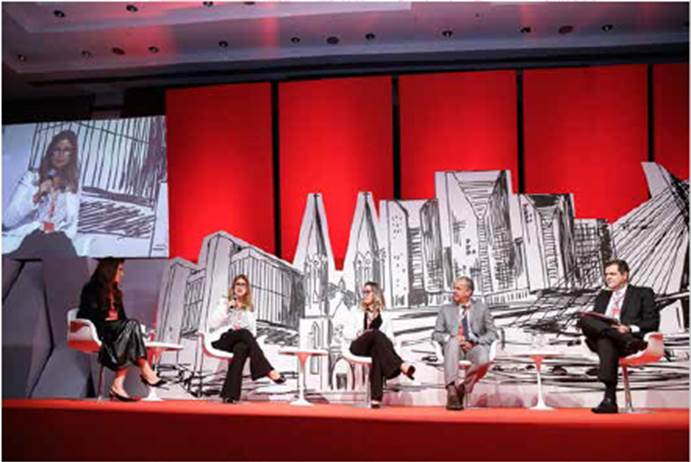
All the guests mentioned the knowledge acquired in each incident as an essential part of the business, as well as the need to include the impact of social networks on planning for crisis situations. “Today, the company learns out about every incident through social networks.Our team is always vigilant.Great care is taken with reactive information and the moment when an incident in the company is made public”, Ivan Carvalho,CEO of Azul Linhas Aéreas, stressed.
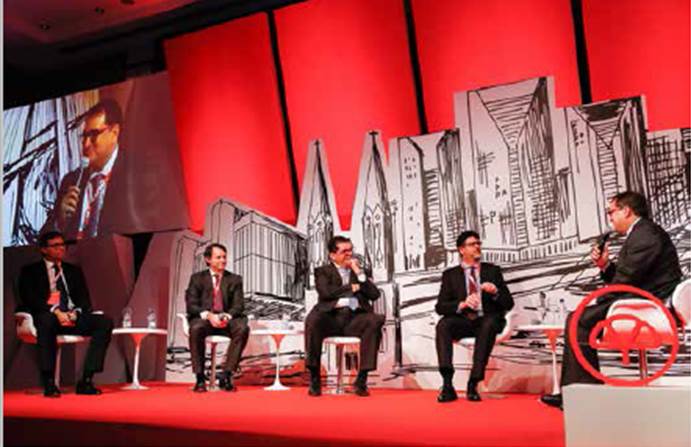
A BETTER EXPERIENCE
Moderated by Daniel Protasio , Territorial Brokers Director, the second panel brought together brokers from different companies to discuss ways to improve customer experience, establish a long-term relationship and stay relevant in an increasingly competitive market.
Willis Towers Watson representative Marcelo Daniel stressed the essential importance of analyzing the industry as a whole and understanding the regulatory risks of each country —”a local focus as part of an overall picture”. Mauricio Masferrer, of Aon, listed improvement measures that the sector could adopt: “We need to improve market efficiency and have more systemic integration between customer, broker and insurer. With that, we can set a trend and help customers make decisions based on facts”. “The customer wants quick answers and for the claim to be settled, but a lot of the old school still remains in our processes” , Daniel noted.
“We innovate where we can. During the Pokemon GO “fever”, we joked about injury insurance for players.I mention this because it is imperative that we understand the real need, do research, have the information and know how to use it.The customer expects this type of consulting”,concluded Raul Nechar, of Marsh.
THIRD-PARTY LIABILITY
Moderated by Dr. Orival Grahl, the third panel offered a reflection on the change of focus in third-party liability: previously the focus was on defining the existence of the person responsible for the incident while the focus now is on compensating the damage suffered by the victim. Years ago, human dignity was a poetic license.Today, constitutional law governs everything, and we are taking giant steps towards addressing the dignity of the living thing, including irrational animals,” Grahl recalled.
Marcia Cicarelli, of Demarest Advogados, mentioned the expansion of case law as well as the deserved importance given to environmental damage. She emphasized the importance of knowing the actual exposure to the risk in the activity of a company prior to establishing the most appropriate coverage. It amounts to a highly detailed analysis of all the sectors of society that could be affected by a loss of major proportions, beyond the scope of the company itself.
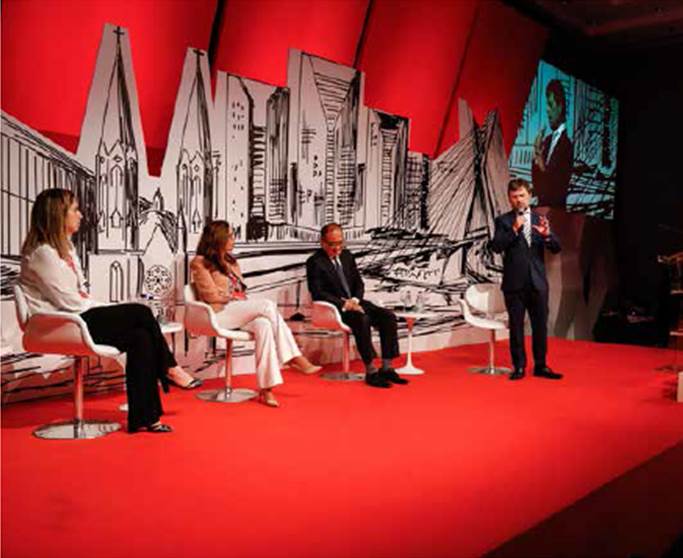
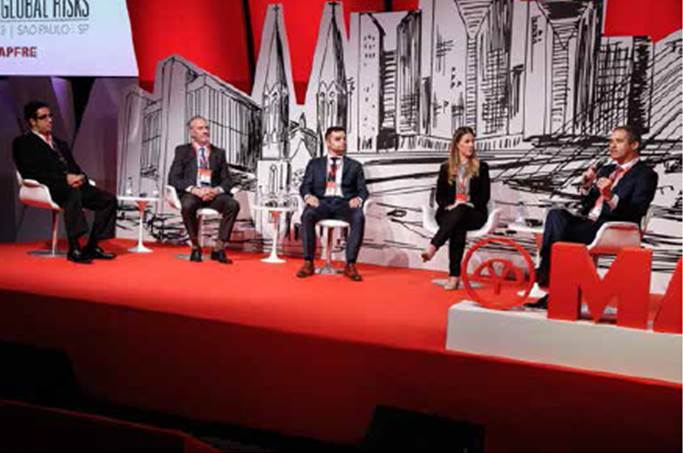
RENEWABLE ENERGY
40% of Brazil’s power grid comes from wind power. This fact, introduced by the GROUP’s Almir Costa, launched the last panel of the day. Challenges and opportunities in this area were then discussed. “We are in 8th place in the 2017 world rankings. And this is with less than 5% of our potential operating; in other words, the potential is enormous”, Francine Pisni, of the Brazilian Wind Power Association (ABEEólica), pointed out.
During the discussion, the participants mentioned the maintenance of wind parks, still relatively new, economic losses, including those from profit losses and weather conditions capable of causing major damage, and challenges to overcome in terms of risk.
The Storm Group specialist, Vitor Gardiman drew attention to the strength of large storms and the need to make forecasts taking into account local realities. “Many of the projects executed here are European, and the wind there is different from ours”, he stated as an example.
The second Global Risks Day concluded with a great exchange of information and one certainty: for a successful business to evolve, knowledge is key.
In their large risk portfolio, multinational insurers benefit from the know-how of their parent companies and subsidiaries all over the world to improve the underwriting and management of risks.What also happens is companies exchange their professional experience in some areas for international experience. The interaction among the teams in different markets is always fruitful, involving information exchanges and the search for new solutions that can be applied to similar scenarios experienced in different markets. At MAPFRE, we have a very connected and prepared global team capable of offering insurance solutions to customers in numerous countries. This facilitates the analysis of the risk and the implementation of good practices that promote the maturation of the domestic market.
PERSPECTIVE OF LARGE RISKS IN BRAZIL
READ THE INTERVIEW WE CONDUCTED WITH LUIS GUTIÉRREZ, PRESIDENT OF THE GROUP FOR THE AUTOMOTIVE, GENERAL INSURANCE AND AFFINITIES DEPARTMENTS.
What do you make of the first and second edition of the event?
Both events followed the presentation format of cases and discussions of strategic issues for the large risks sector in the Brazilian market. The second edition focused more on third-party liability and customer relations, encouraging a focus based on innovation. Global Risks Day is now a real success in Brazil. This is reflected not only by the number of participants but also the diversity of the subject matters addressed. Despite the challenges that insurers face, Brazil offers excellent opportunities for large risks, and the discussion that we encourage gives rise to important reflections on the maturing of this market.
How do you assess the participation of large risks insurance in the current Brazilian economy?
Brazil is one of the most promising sectors for the development of large risks. After Spain, Brazil is MAPFRE’s biggest market, where the energy, oil, gas, transportation, aircraft and industry sectors are the main business areas. We are the market share leaders in the sector. Even though the civil construction and large infrastructure project sectors will not regain significant activity until 2019, we are confident that the recovery of economic growth in the country will increase the volume of large risk premiums even for the current year. Brazil is considered a non-catastrophic market, and for this reason it is extremely attractive.
In comparison with the international market, what practices might the Brazilian large risks market adopt in the near future?
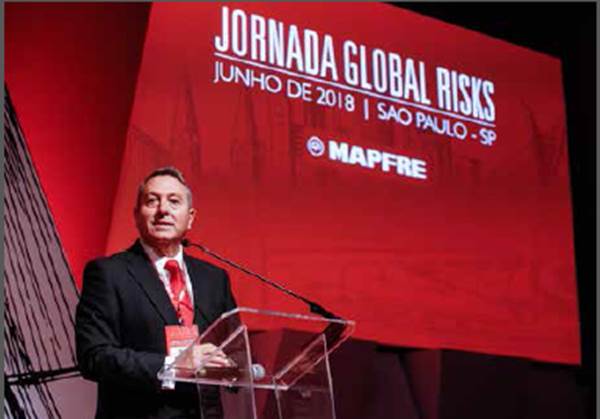
In their large risk portfolio, multinational insurers benefit from the know-how of their parent companies and subsidiaries all over the world to improve the underwriting and management of risks.What also happens is companies exchange their professional experience in some areas for international experience. The interaction among the teams in different markets is always fruitful, involving information exchanges and the search for new solutions that can be applied to similar scenarios experienced in different markets. At MAPFRE, we have a very connected and prepared global team capable of offering insurance solutions to customers in numerous countries. This facilitates the analysis of the risk and the implementation of good practices that promote the maturation of the domestic market.
The next Brazilian edition of Global Risks Day will be held in 2020.Until then, you can keep up with the reports, trends and latest events of the sector right here.See you soon!





